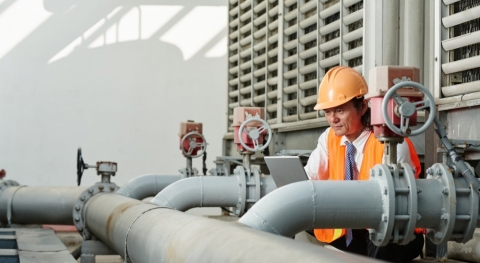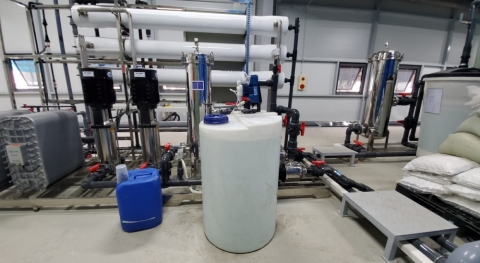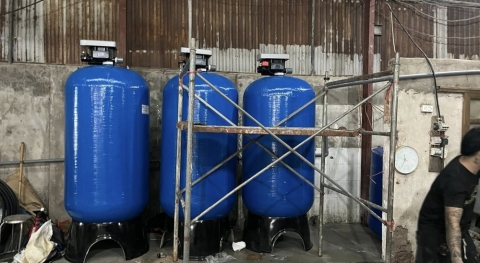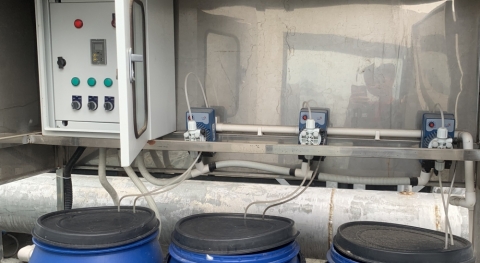
Anti-Corrosion and Anti-Scaling Solutions for Boilers
Boilers are essential equipment in many industrial sectors, providing steam for production processes. However, during operation, boilers often face two major problems: corrosion and scaling. If not properly managed, these issues can decrease efficiency, increase operational costs, and even damage equipment.
Below are effective solutions offered by Reechem to combat corrosion and scaling, ensuring optimal performance and extending the lifespan of your boiler system.
.jpg)
1. Causes of Corrosion and Scaling in Boilers
1.1 Corrosion in Boilers
Corrosion occurs due to chemical reactions between the metal surfaces of the boiler and impurities in the feedwater. Key causes include:
-
Dissolved oxygen in water: Leads to pitting and metal surface degradation.
-
CO₂ in water: Forms carbonic acid (H₂CO₃), which lowers pH and causes corrosion.
-
Improper pH levels: Water pH outside the optimal range (typically below 8.5 or above 12) damages metal surfaces.
-
Deposits on metal surfaces: Create localized electrochemical cells, accelerating pitting corrosion.
1.2 Scaling in Boilers
Scaling is the buildup of hard deposits caused by the precipitation of dissolved minerals at high temperatures. Major causes include:
-
High levels of Ca²⁺ and Mg²⁺: Form calcium carbonate (CaCO₃) and magnesium hydroxide (Mg(OH)₂) scales.
-
Iron (Fe³⁺) and silica (SiO₂): Form iron hydroxide and silica scales, which are difficult to remove.
-
Improperly treated feedwater: Leads to mineral concentrations exceeding saturation limits.
-
Ineffective blowdown procedures: Allow solids to accumulate in the boiler.
.jpg)
2. Solutions to Prevent Corrosion and Scaling
2.1 Pre-Treatment of Boiler Feedwater
Proper feedwater treatment is the most critical step in preventing corrosion and scaling. Methods include:
-
Water softening: Use ion exchange resins to remove Ca²⁺ and Mg²⁺.
-
Deaeration: Remove dissolved oxygen via thermal methods or oxygen scavengers (e.g., Na₂SO₃, hydrazine).
-
pH control: Adjust feedwater pH to 9.0–11.0 using NaOH or phosphate compounds.
-
Mechanical filtration: Remove physical debris before water enters the boiler.
-
Silica removal: Apply precipitation or ion exchange techniques to reduce SiO₂ levels.
2.2 Use of Anti-Corrosion and Anti-Scaling Chemicals
These maintenance chemicals help manage corrosion and scaling effectively:
Anti-Scaling:
-
Phosphate inhibitors (e.g., Na₃PO₄, NaH₂PO₄): Keep Ca²⁺ and Mg²⁺ ions in soluble form.
-
Polyphosphates and dispersant polymers: Prevent the formation of CaCO₃ scales.
-
Chelating agents (EDTA, NTA): Bind with metal ions to reduce scale formation.
Anti-Corrosion:
-
Sodium sulfite (Na₂SO₃): Removes dissolved oxygen.
-
Tannic acid and hydrazine (N₂H₄): Protect metal surfaces from oxidation.
-
pH regulation using NaOH: Lowers water corrosiveness.
📌 Recommended Chemicals:
-
Maxtreat 3100 L – Oxygen scavenger
-
Maxtreat 3220 – Scale inhibitor
2.3 Regular Blowdown Control
-
Continuous blowdown: Helps remove accumulated dissolved solids.
-
Monitor TDS and conductivity: To determine appropriate blowdown frequency.
-
Balance water replenishment: Maintain chemical equilibrium in the system.
2.4 Use of Corrosion-Resistant Materials
-
Use stainless steel tubes (Inox 304, 316): Enhance corrosion resistance.
-
Protective coatings: Epoxy or ceramic coatings reduce direct water contact with metal surfaces.
2.5 Monitoring and Scheduled Maintenance
-
Routine testing: Measure pH, TDS, and dissolved oxygen to detect issues early.
-
Clean heat exchanger surfaces: Remove scale to optimize thermal performance.
-
Online monitoring systems: Ensure continuous water quality tracking.
.jpg)
3. Benefits of Applying Corrosion and Scale Control Solutions
-
Lower fuel consumption: A 1mm scale layer can reduce heat transfer efficiency by up to 10%.
-
Extended boiler lifespan: Corrosion control enhances equipment durability.
-
Reduced maintenance and repair costs: Prevent major issues caused by scaling and corrosion.
-
Safer operation: Minimize explosion risks from overheating or leaks.
-
Improved steam quality: Ensure clean, contaminant-free steam for production processes.
.jpg)
4. Conclusion
To effectively protect boilers from corrosion and scaling, a comprehensive approach is required: feedwater treatment, use of maintenance chemicals, regular blowdown, and scheduled monitoring. Implementing these methods not only boosts operational efficiency but also cuts costs and extends equipment longevity.
For consultation or support, please contact:
REECHEM CO., LTD.
Address: 5th Floor, Lighthouse Building, 1254 Xo Viet Nghe Tinh, Hoa Cuong Nam Ward, Hai Chau District, Da Nang City
Phone: 0236 391 88 68 / Hotline (Zalo): 0789 086 626
Email: info@reechem.com.vn
Website: reechem.com.vn















